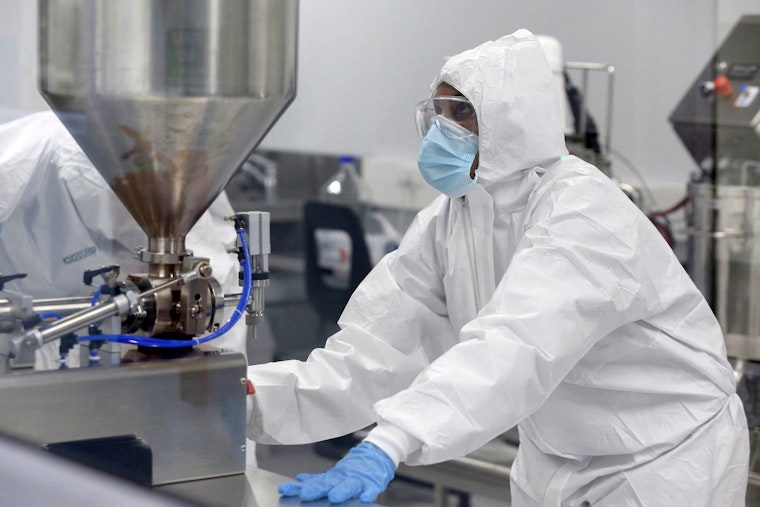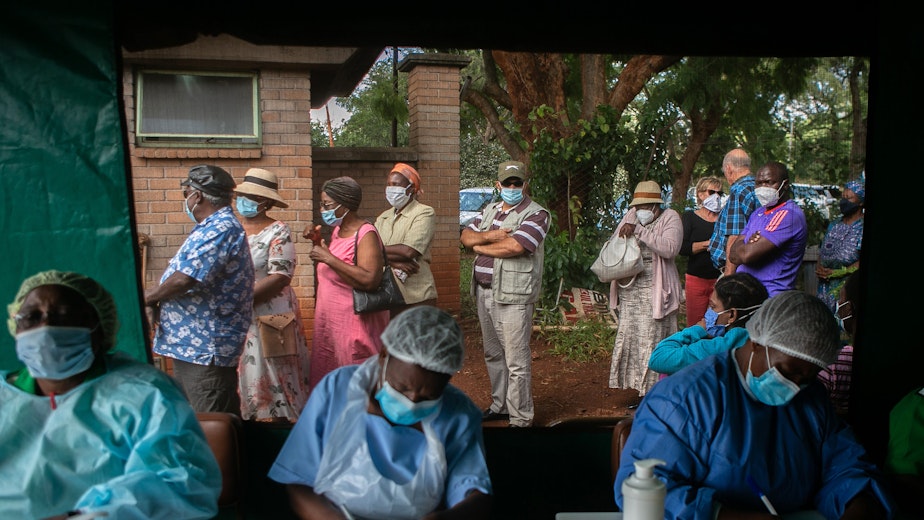The Quest to Boost Africa’s Fight Against COVID-19
By Erin Greenberg & Kiti Kajana Phillips

When the COVID-19 coronavirus first hit in December of 2019, big pharmaceutical companies swung into action, rushing to produce vaccines at a record pace. Once the Moderna and Pifzer shots were approved in the United States and Europe, the rollout was swift—but profoundly uneven. Many in the Global North received their second and third doses before the majority of people in the Global South saw their first shots. Together, the three major vaccine producers sent more than 70 percent of their doses to wealthy countries. The dramatic inequities resulted in death on a massive scale.
Now, a small group of South African scientists are working to change all that—with major implications not only for the African continent’s ability to combat COVID-19, but to manage future pandemics and disease outbreaks as well.
Twenty minutes outside Cape Town’s city center lies a row of small, unassuming buildings in a quiet, industrial area. It is here, at the headquarters of Afrigen Biologics, a South African biotech startup, that scientists are producing the continent’s first Messenger RNA (known as mRNA) COVID-19 vaccine.
Inside the lab, scientists and clinical technicians—many of whom are women—are outfitted head-to-toe in personal protective equipment and enormous goggles, huddling over microscopes. They’ve reverse-engineered Moderna’s COVID-19 vaccine using publicly available information to get around patent barriers in less than nine months. There is a palpable buzzing energy in the room, fueled by the enormous stakes: The mRNA vaccines are crucial to the fight against COVID and other diseases, because they can be produced in large quantities and more rapidly than other vaccines. They are also more effective in preventing infection and serious illness.
Africa consumes 25 percent of the world’s vaccines, but only 1 percent of vaccines are manufactured there. And while leaders in the Global North are declaring the pandemic “over,” 80 percent of people in low-income countries have yet to receive their first dose. Afrigen and its partners could vastly change the production of life-saving vaccines across the continent, breaking a cycle of dependency on the West and dramatically reducing such disparities in the years to come.
The initiative at Afrigen—along with its partner Biovac, a partially state-owned South African vaccine producer—is part of the World Health Organization’s effort to develop the next generation of mRNA vaccines and drugs to expand global access in low- and middle-income countries, and close the yawning gaps in the global distribution of vaccines during the pandemic.
The underlying problem is that many low-income countries rely on the goodwill of richer ones and their pharmaceutical companies to access life-saving vaccines, treatments, and tests. “No other event like the COVID-19 pandemic has shown that reliance on a few companies to supply global public goods is limiting, and dangerous,” Dr. Tedros Adhanom Ghebreyesus, director-general of the World Health Organization (WHO), said in an announcement earlier this year.
The South African hub seeks to address that problem head on. The WHO selected Afrigen and Biovac to give poor and middle-income countries the know-how to make COVID vaccines—after Pfizer, BioNtech, and Moderna declined requests to share their technology and expertise. The hub could challenge big Western pharmaceutical companies’ grip on global vaccine supplies and knowledge sharing, undermining Big Pharma’s business model, which relies on legally enforceable patent protections.
The initiative’s ambitions go beyond Africa—with implications for vaccine manufacturing in different corners of the world, including countries that have not had the technology, capacity, and training to produce their own vaccines. The hub will transfer the technology and know-how to 15-20 countries in the Global South (known as “spokes”), creating a network of resource-sharing scientists producing mRNA vaccines in lower-income countries. Scientists from the Brazil, Argentina, Indonesia, and Egypt “spoke” have traveled to the hub in South Africa to learn about the process and start training.
This effort also has ramifications beyond COVID-19. The hub plans to produce mRNA vaccines for other diseases in the future, including malaria, HIV, and dengue. Charles Gore, director of the Medicines Patent Pool, which is helping the WHO establish the hub, said, “This is the single most exciting project in global public health. It’s about empowerment.”
Yet, success is far from guaranteed; the hub is up against multibillion dollar pharmaceutical companies, and the broad patents filed by Moderna in South Africa could threaten that work. The WHO hoped that one of the major pharmaceutical companies would assist Afrigen and allow the hub to sell mRNA vaccines. But they never responded to the WHO’s request. After Afrigen announced that it would attempt to make the mRNA COVID-19 vaccine, Moderna obtained several vaccine patents in South Africa that won’t expire until 2034. Both Pfizer and Moderna have said that they need to oversee technology transfer because of the complicated manufacturing process. Stéphane Bancel, Moderna’s CEO, has said that the company won’t impede on Afrigen’s work in South Africa, but there are currently no guarantees in place.
Civil society groups like the People’s Vaccine Alliance have repeatedly called for Moderna to withdraw these patents to safeguard the work of the hub. These groups hope that the South African government will amend the law to reject the patents, as countries such as Canada have.
The success of the hub and the companies it transfers technology to will also depend on the willingness of governments and groups like Gavi, the global vaccine alliance, to buy vaccines that may cost more initially than those made by large pharmaceutical companies. For its part, the Open Society Foundations have been a strong supporter of the hub, the quest to support manufacturing in the Global South, and efforts to expose and address the deep inequity in the rollout of COVID-19 vaccines, testing and treatment. Last year, the Foundations invested in Belgium-based company Univercells, which is working closely with Afrigen on the development of mRNA vaccines.
Despite the complicated challenges, the hub’s team, led by Managing Director Petro Terblanche, is confident they will prevail. “We will succeed. We have to—for the future of global health. For the future of Africa,” she said.
Erin Greenberg is a team manager for Communications at the Open Society Foundations.
Kiti Kajana Phillips is a senior program officer for Initiatives at the Open Society Foundations.
